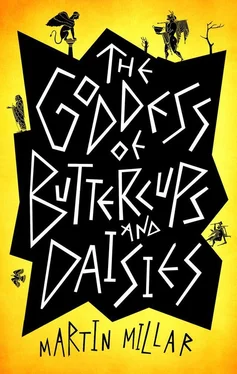Her situation was now desperate. She was close to death on several occasions as she struggled to rise while blocking her opponent’s sword. She’d almost made it back to her feet when they were interrupted by a woman’s laugh. It wouldn’t have made Bremusa stop fighting but, to her surprise, Idomeneus took a step backwards. He didn’t lower his guard, but did turn his eyes to the newcomer. Bremusa risked a sidelong glance. She realised she no longer had to search for Laet. The female who strolled to Idomeneus’s side could be no one else, because she was obviously not quite human.
Laet was tall, like the Amazon. Her robe was as finely spun as anything seen on Mount Olympus, but darker, and it clung to her figure in a way that might have made Aphrodite envious. She glanced at the broken timbers.
‘You shouldn’t have jumped on that old boat. The timbers were bound to give way. But people do seem to make bad decisions when I’m around.’
She turned to Idomeneus. ‘Idomeneus, we’re trying to remain discreet. Is it necessary for you to fight this woman?’
‘She’s an Amazon. I hate Amazons. I’d have killed her at Troy, if she hadn’t suddenly vanished when my spear was at her throat.’
‘Really?’ Laet regarded Bremusa with her coal-black eyes. The pallor of her skin suggested she was rarely exposed to sunlight, or even daylight.
‘You fought at Troy?’
‘I did.’
‘But you disappeared from the field of battle? Presumably you were saved by some god?’
‘By the Goddess Athena.’
‘Ah. I see. Have you been with her ever since?’
‘Yes.’
‘Then I assume the goddess has now sent you here to look for me?’
That, thought Bremusa , was rather astute. Not wanting to show she was impressed by her deduction, she didn’t reply.
‘No doubt Athena fears I’ll wreck the peace conference.’ Laet smiled, not pleasantly. ‘She’s right.’
Incongruously, she yawned. Bremusa felt insulted.
‘Come, Idomeneus. I’m tired. There are children playing nearby and that always gives me a headache. I don’t find this Amazon very interesting. You can kill her another time if it really bothers you.’
They walked off up the shingle beach towards the city. Bremusa watched them go. She suddenly realised how fatigued she was from the battle, under the sun, in her leather armour. Her skin was caked with perspiration.
Two children ran screaming in front of her, pursued by their female attendant. She was a stern-looking woman who scolded her charges, both around eight years old.
‘Plato, Xenophon, stop fighting! Can’t you behave better in public? Stop staring at the foreign woman and come with me.’
They departed, young Plato and Xenophon still scuffling with each other. Bremusa turned round and hurried towards the shrine. She urgently needed to talk to the Goddess Athena.
There were two shops in Athens which sold beautiful, expensive lyres, instruments good enough for a professional to play on stage. There were several stalls in the agora that stocked instruments of slightly lesser quality, the sort that wealthy young men might use while for playing music with their friends. Close to the harbour, there was Straton’s junk shop which sold the cheapest instruments in the city. That was where Luxos had bought his lyre. It wasn’t a high-quality instrument. He wasn’t even sure that it was made from genuine turtle shell. Nonetheless, Luxos loved his lyre, and had taught himself to play, copying the musicians he saw performing at the gymnasium. A true Greek poet recited his poetry to the accompaniment of the lyre, and Luxos had learned how to do it, without instruction.
Not far from the junk shop was Lysander’s pawn shop, current location of Luxos’s lyre. He’d been ashamed when he pawned it to buy food; as ashamed as a man throwing down his shield when he fled from the battlefield: he’d only done it after fainting from hunger. Like many people in Athens, Luxos was very poor, and unlike most, he had no family to fall back on. As a young orphan the community, his deme, had fed and cared for him, after a fashion, but after he reached the age of eighteen he was on his own. It would have been difficult at the best of times. With Athens in the state it now was, he was struggling to survive. For a while he’d tried to earn money by singing and playing on the street, but no citizen in Piraeus had much money to spare for street performers. He tried playing in some of the wealthier areas uptown, but the Scythian archers chased him away.
Now, with Aristophanes’ money, he hurried to reclaim his lyre. He was happy and excited to retrieve his instrument, but as he left the shop, he remembered what Aristophanes had said. No one would ever listen to his songs or his poetry. Previously Luxos had ignored all criticism, banished all discouragement, but for some reason the words struck home. He looked around at Athens, and for the first time it seemed like an unfriendly place. There was something different in the air. He couldn’t say what, but he could feel a great cloud of depression settling over him.
Luxos the poet trudged home, to the abandoned shack behind the great dockyard where triremes were constructed. There he sat and played his lyre. This cheered him a little, but he kept hearing Aristophanes’ words: You don’t come from the right class. You weren’t educated like a gentleman. You never had a proper teacher. You don’t have a patron, or any influential friends. It was all true. The sons of the wealthy citizens of Athens were schooled in literature, philosophy and rhetoric from a young age. Luxos wasn’t. Those same wealthy young men had influential friends to call upon should they ever wish to see their lyrics or poetry performed in public. Luxos knew no one influential.
His shoulders slumped. For as long as he could remember, he’d dreamed of striding out onto the stage at the great theatre and performing for the whole of Athens. Now he wondered if that would ever happen. Perhaps Aristophanes was right. Perhaps no one would ever be interested in his poetry.
Aristophanes knew that Philippus wasn’t happy. He was a good actor but he’d never been able to reconcile himself to being successful only in comedies. He could put a funny line over like few others in Athens, but somewhere in his mind there was the thought that, really, he should have been a serious dramatic player, taking the leading role in one of the great tragedies of Sophocles or Aeschylus. Aristophanes found it difficult to sympathise. It wasn’t as if being a successful comic actor hadn’t brought Philippus success. He’d won plaudits on numerous occasions, in his plays, and in others’. People still talked of his hilarious performance in Aristophanes’ production last year, The Wasps . He had plenty of admirers, and a good reputation throughout the city. It should have been enough, in Aristophanes’ opinion.
Actors. They’re never satisfied with what they have.
It was no surprise when Hermogenes told him that Philippus was complaining.
‘He’s always complaining. What’s wrong this time? Not enough olives in his dressing room?’
‘It’s the dung beetle. He doesn’t like it.’
Aristophanes followed Hermogenes across to the rehearsal stage where Philippus, in mask and costume, was sitting astride a giant dung beetle. This beetle was one of their few successful props, constructed to look rather humorous. It was brightly painted, with a smiling expression and a fat, funny body. By means of the stage crane, it could be hoisted into the air and made to fly over the stage. It could even be swung over the front rows of the audience, which was quite a spectacular effect. When Philippus used his giant phallus as a rudder to steer the flying beetle, it was going to get a huge laugh. Even the stagehands found it funny, and they were generally a hard group to please, having already seen most things.
Читать дальше












